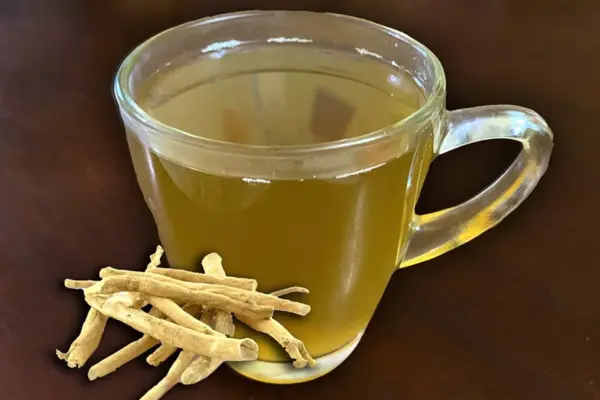Ashwagandha tea recipe, a traditional Indian beverage, has been gaining popularity worldwide for its numerous health benefits.
This tea, made from the roots of the Ashwagandha plant, is not just a soothing drink but also a powerful herbal remedy.
In this comprehensive guide, we will explore the various aspects of making Ashwagandha tea recipe, including its benefits, preparation methods, and variations.
What Is Ashwagandha?
Ashwagandha, scientifically known as Withania Somnifera, is an adaptogenic herb widely used in Ayurvedic medicine.
It’s renowned for its ability to reduce stress, improve concentration, and enhance overall well-being.
The roots of this plant are the main ingredient in preparing Ashwagandha tea, which carries the essence of this powerful herb.
Traditional Ashwagandha Tea Recipe
Recipe Details:
- Preparation Time: Approximately 15 minutes
- Course: Beverage
- Cuisine: Indian (Ayurvedic)
- Yield: Serves 2
- Calories Per Serving: Approximately 10-15 calories per cup (without sweetener)
To make traditional Ashwagandha tea recipe:
Ingredients:
- 1 teaspoon of Ashwagandha root powder
- 2 cups of water
- Honey or sweetener of choice (optional)
Method:
- Boil the water in a saucepan.
- Add Ashwagandha root powder to the boiling water.
- Simmer for 10 minutes on low heat.
- Strain the tea into a cup.
- Add honey or a sweetener if desired.
- Enjoy the warm tea.

Variations Of Ashwagandha Tea
Ashwagandha tea can be customized in various ways to suit individual tastes:
- Ashwagandha And Turmeric Tea: Add a pinch of turmeric for its anti-inflammatory properties.
- Ashwagandha And Ginger Tea: Ginger adds a spicy flavor and aids in digestion.
- Ashwagandha Chai: Incorporate traditional chai spices like cinnamon, cardamom, and cloves for a flavorful twist.
Health Benefits Of Ashwagandha Tea
Ashwagandha tea offers a range of health benefits. It’s known to:
- Reduce Stress And Anxiety: Ashwagandha has natural stress-relieving properties that calm the mind and promote relaxation.
- Boost Immune System: Regular consumption can strengthen the immune system, making it a great choice, especially during flu season.
- Improve Sleep Quality: The calming effects of Ashwagandha also aid in improving sleep quality, making it an excellent choice for those with sleep disorders.
- Enhance Cognitive Function: This tea can also help in improving memory and cognitive functions.
Storing And Using Ashwagandha Powder
To ensure the freshness of Ashwagandha powder:
- Store it in an airtight container in a cool, dry place.
- Use within six months for maximum potency.
Precautions And Side Effects
While Ashwagandha tea is generally safe, it’s important to consider some precautions:
- Pregnant or nursing women should avoid it.
- Consult a healthcare provider before use if you have any medical conditions or are on medication.
Conclusion
Ashwagandha tea is a wonderful herbal beverage that not only offers a soothing experience but also numerous health benefits.
Whether you are looking to reduce stress, boost your immune system, or improve your cognitive functions, this tea can be a great addition to your daily routine.
Remember, the key to reaping the benefits of Ashwagandha tea lies in its regular and consistent consumption. So, brew a cup today and step into a world of wellness.

Ashwagandha Tea Recipe: A Comprehensive Guide
Ingredients
- 1 teaspoon of Ashwagandha root powder
- 2 cups of water
- Honey or sweetener of choice optional
Instructions
- Boil the water in a saucepan.
- Add Ashwagandha root powder to the boiling water.
- Simmer for 10 minutes on low heat.
- Strain the tea into a cup.
- Add honey or a sweetener if desired.
- Enjoy the warm tea.